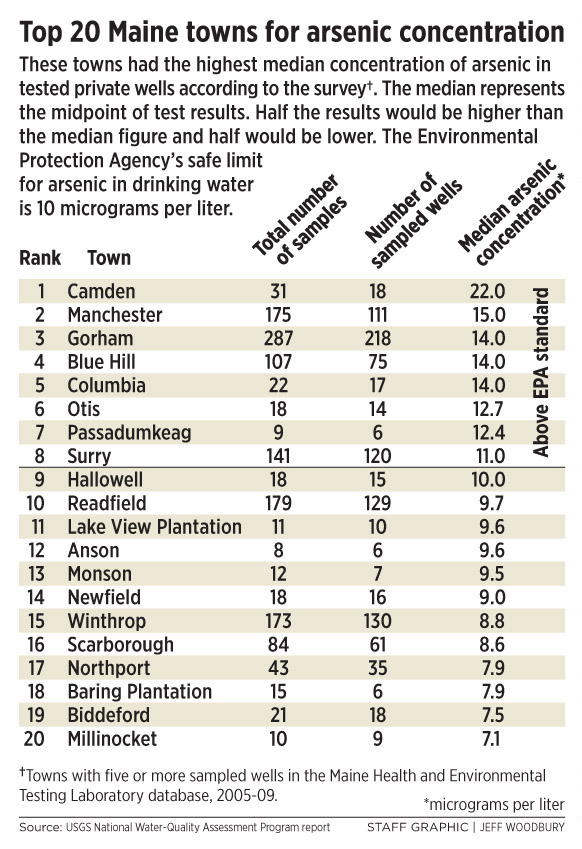Arsenic has contaminated more private well water across Maine and is present at higher levels than previously suspected, according to a new study.
The report by the U.S. Geological Survey shows potentially harmful arsenic levels in communities where the problem had not previously been identified. Levels of the naturally occurring toxic chemical exceed the federal drinking water standard by 10 to 100 times, the study concludes.
Public officials are now stepping up their efforts to encourage all Maine households with private wells to have their water tested.
“We really want to get the message out. People really need to test their wells,” said Martha Nielsen, a scientist with the U.S. Geological Survey. She led the study in cooperation with the Maine Center for Disease Control and Prevention.
Several cities and towns in Cumberland and York counties are among the 30 communities where researchers found wells with the highest peak or median arsenic concentrations. Gorham, Scarborough and Biddeford are listed because of high readings.
While scientists have known for decades that Maine has elevated arsenic levels — enough to prompt several major health studies — the new study shows large differences in concentrations from well to well within the same community.
Nielsen said the study still provides a better indicator of potential hot spots than earlier studies. It is the largest study of its kind in Maine, and possibly the country.
The researchers looked at data from more than 11,000 wells in 530 communities, using samples submitted to the Maine Health and Environmental Testing Laboratory from 2005 to 2009. It was designed to help officials better target their efforts to encourage well owners to test their water regularly.
Arsenic occurs in bedrock and leaches into groundwater through fractures in the rock. It has been linked to health problems, including lung, bladder, skin and other forms of cancer, developmental problems in children, circulatory problems, cardiovascular disease and diabetes.
About half of Maine’s population gets its drinking water from private wells, which are not regulated. Public water supplies must meet the federal standard of no more than 10 micrograms of arsenic per liter.
While other regions of the country have elevated arsenic levels, those levels are not considered a threat to public health because the areas are largely served by public water systems.
Only 40 percent of Maine’s private well owners have had their wells tested for arsenic, said Andrew Smith, the state toxicologist. About 10 percent of the tested wells have arsenic above safe levels. It is not known how many owners of contaminated wells have taken steps to fix the problem.
Homeowners can take various steps to mitigate high arsenic levels, Smith said.
If the arsenic level is only slightly elevated, he said, a homeowner may simply need to switch to bottled water for drinking.
There are water filtering systems that can be installed at sinks used for drinking water. Comprehensive treatment systems can cost tens of thousands of dollars.
Attempts to pass laws requiring arsenic testing have failed in the past. The Maine Association of Realtors has developed a model purchase-and-sales agreement that lists arsenic as one of the possible contaminants for which well water should be tested.
It costs $15 to $25 for an arsenic test and $60 to $70 for a more comprehensive test for other contaminants, such as manganese, radon and uranium.
Smith said the state is working to map the presence of other well contaminants across the state.
Staff Writer Beth Quimby can be contacted at 791-6363 or at:
bquimby@pressherald.com
Copy the Story Link
Send questions/comments to the editors.




Success. Please wait for the page to reload. If the page does not reload within 5 seconds, please refresh the page.
Enter your email and password to access comments.
Hi, to comment on stories you must . This profile is in addition to your subscription and website login.
Already have a commenting profile? .
Invalid username/password.
Please check your email to confirm and complete your registration.
Only subscribers are eligible to post comments. Please subscribe or login first for digital access. Here’s why.
Use the form below to reset your password. When you've submitted your account email, we will send an email with a reset code.